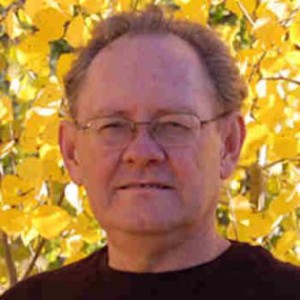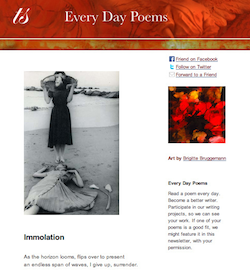Joseph Hutchison was appointed Colorado Poet Laureate on September 9. During his four-year term, Hutchison will travel throughout Colorado as the state’s official ambassador for poetry and literacy. He plans to produce poetry-related resources, such as a database of Colorado poets, that teachers could use to develop their students’ awareness of poetry and its connection to daily life. Professor Hutchison, who has published work in scores of prestigious literary periodicals, took time from his academic and administrative duties at University College at University of Denver, to respond to an in-depth interview, via e-mail, about his experience of poetry—as a child, as student, and as a teacher.
_______________________________________________
Is there a particularly opportune time in a student’s life to introduce poetry?
Most children are introduced to poetry very early on, in the form of lullabies and nursery rhymes. They need more of it, in the form of really good poems for children: Mother Goose, of course, Shel Silverstein, and X.J. Kennedy’s “Knock at a Star: A Child’s Introduction to Poetry.”
All poetry is rooted in breath and vocal cord vibrations, so reading aloud to kids is essential.
What do you remember about being introduced to poetry and about writing your own first poem in school?
I was grown before Shel Silverstein came along, so for me it was “Mother Goose” and kids’ songs on ‘45s (“I’m Gettin’ Nuttin’ for Christmas” and the rather sly “Santa Claus Looks Like My Daddy”).
Dad had a wonderful bedtime ritual: He would rub my back and sing Babes in the Woods, a sad, sad song based on a traditional ballad first published in England in 1595, though he got it from the radio when he himself was a child. The ballad by then had morphed into one of those mournful Appalachian hill-country songs.
My parents didn’t read for pleasure but they kept lots of books in the house, among them a volume of Edgar Allan Poe, [from which] I first read The Raven, Ligeia, and Annabel Lee—music of another kind.
I may have written poems in school but I don’t remember [poetry] specifically in classes. I’m sure I didn’t write a poem until seventh grade, and then on my own, not in response to an assignment.

Above all, they were enthusiastic and intelligent.
My favorite teachers—Jim and Frances Roome, Vernice Van Duzer—loved language, the puzzle of it, the exalted complexities of it, the subtleties. There was never one meaning, only a web of meanings that existed together in the poems. And they connected [those meanings] to what was familiar.
The Roomes had us reading Romeo and Juliet side-by-side with West Side Story, so we could see how the latter was based on the former, how changing the setting and time period changed the action and the language.
Mrs. Van Duzer introduced us to “reader’s theatre, ” and an especially interested group of us would take a short story—[Joseph] Conrad’s The Lagoon or [John] Steinbeck’s “The Pearl”—or poems by T.S. Eliot, or a play (I especially remember [Jean Paul] Sartre’s No Exit), and we’d cut it for a 20- to 40-minute performance. What a revelation!
When you were in school, which poets most sparked your interest in poetry, and why?
Edwin Muir, Robert Frost, e.e. cummings.
We were encouraged to read outside of class and bring in our discoveries, which is how I very early on found my way to Francois Villon and George Whicher’s “The Goliard Poets: Medieval Latin Songs and Satires.” Very odd stuff for a 16-year-old. Of course, I also discovered [Lawrence] Ferlinghettti, [Allen] Ginsberg, and [Kenneth] Rexroth, [and] Gary Snyder and Richard Brautigan. My first and only attempt at a play was a knockoff of Ferlinghetti’s Unfair Arguments with Existence.
I have to add that I didn’t really understand most of this stuff. It was the sound of it, the romance of long-dead poets whose voices I could hear in my head side-by-side with Beat poets from San Francisco. To me, that was magical. I didn’t have to understand it all. Eliot says somewhere that a good poem can communicate before it’s understood. That communication is what matters.
Have you served as a poet-in-residence in any schools? If yes, what have been some of your takeaways about that experience?
I worked in Poets-in-the-Schools programs in Colorado and Oregon but I was never a poet-in-residence. I’ve never been a full-time member of the Academy, which, these days, is required to be a poet-in-residence.
At what school levels have you taught poetry?
I’ve taught elementary school kids between grades 3 and 6, all the junior high and high school grades, college undergrads and graduate students, and adult learners in formal academic and very informal settings as well.
Dana Gioia has said, “Poetry, and especially recitation of poetry, might be one of the most practical and important things you learn in school.”* What do you tell students who ask, “Why should I study poetry?”
First of all, let me say that there is a difference between poetry and verse. Verse is a form; poetry is a way of layering language, making it carry more meaning than it does in everyday speech. Poetry can happen in verse or in prose. So we make a terrible mistake when we teach poetry as verse, as this variety of forms. Poetry is a way of knowing, of thinking deeply about one’s life and the lives of others, not just people but animals and plants, the life of the planet.
The world is steeped in meanings, the vast majority of which are not human meanings. But we exist in the world and because of the world. It’s the poet’s job to wrestle with all those meanings, to bring them into human language as much as possible.
If we taught poetry as a way of knowing, students wouldn’t have to ask why they should study it. They would see that poems are speaking to and about their lives.
As for recitation, yes—it’s crucial to feel the breath rising from one’s own lungs, passing through one’s own voice box, and unfolding in words on the air in front of one’s own face.
What do you say to teachers who ask, “Why should I teach poetry?”
Same answer as above. Again, don’t bother teaching poetry if all you’re teaching are forms. Forms come and go, fall in and out of favor, and forms differ from culture to culture, from one language to another. The forms matter but they’re not the poetry itself. Poetry animates the forms.
Once you shift focus to the content of poetry, poetry as a way of knowing what it means to be in the world, you see why it’s important to teach it. That said, poetry is the most ancient spoken art, and it still—the best of it—does the profoundest thinking about being alive.
Photo by Freaktography, Creative Commons license via Flickr. Post by Maureen Doallas, author of Neruda’s Memoirs: Poems.
* Dan Stone, Dana Gioia, et al., Poetry Out Loud National Recitation Contest: Performing Poetry: An Audio Guide (National Endowment for the Arts, 2005)
Joseph Hutchison’s Website
Joseph Hutchison on Facebook and Google+
Joseph Hutchison blogs at The Perpetual Bird
__________________________________________
Start your day with poetry.
Buy a year of Every Day Poems, just $5.99
- Persecuted Poets: Hearing the Voices Beyond Our Borders - November 30, 2016
- Writing with Matisse in Mind - October 26, 2016
- Healing with Poetry: Interview with Fred Foote (Part 3) - September 10, 2015

Matthew Kreider says
“If we taught poetry as a way of knowing, students wouldn’t have to ask why they should study it.” Great statement.
And a great interview, Maureen!
Maureen Doallas says
Thank you, Matt. I so enjoyed doing this interview. Professor Hutchison is refreshingly frank. He has much more to say about teaching poetry. The next two parts will post, respectively, on Nov. 5 and Nov. 12.
Richard Maxson says
Excellent interview, Maureen. I look forward to your next postings.
I do appreciate Professor Hutchinson’s views on teaching poetry as a meditation on something seen, felt, or heard. In a sense we have been given the responsibility to communicate with one another about this world. Poetry seems to be that medium that can actually demonstrate the complexity and ambiguity found around us by applying those same characteristics found in language.
What a true teacher!
Maureen Doallas says
Thank you for reading and commenting, Richard.
I agree. I think Professor Hutchison must be a wonderful teacher.